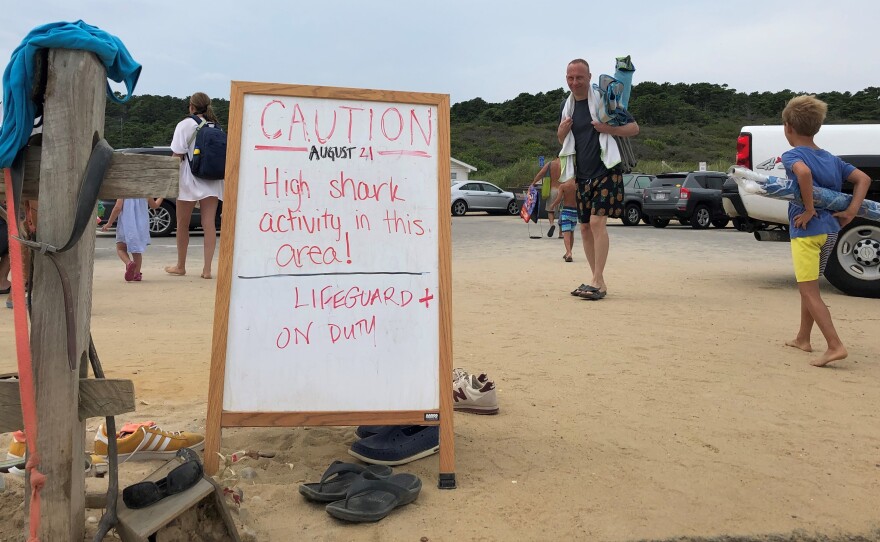A year after a young man was killed by a shark off Cape Cod — the first such death there in more than 80 years — beach towns full of vacationers are struggling to manage an influx of great whites.
Sharks off the coast have become more common in recent years as the seal population they hunt has increased. Scientists point out that sharks do not target humans, though they can mistake them for prey. But many officials believed the attack was only a matter of time.
Last year's death happened while a 26-year-old was boogie boarding. Weeks before that, another man was attacked and fought off a shark while swimming in what he said was 8 to 10 feet of water. Both those incidents have driven home the risk for many.
On Newcomb Hollow Beach in Wellfleet, Mass., vacationer Olivia Gattuso says she normally enjoys hourlong swims. She is being more cautious now.
"I mean yesterday was a really good swimming day, and I wouldn't let myself go anywhere above my waist because I was too afraid, she says.
In recent months, Outer Cape towns have been making changes to protect beachgoers from sharks. With grant money from the state, many have purchased taller lifeguard chairs to help lifeguards see farther offshore and spot sharks or seals. Beach entrances have updated shark warning signs, which note that sharks hunt seals in shallow water. Some beaches have landline emergency phones and first-aid kits.
At Newcomb Hollow Beach, there's also a new high-tech buoy in the water that alerts lifeguards when it detects a tagged shark in the area.
"We actually are just coming off of a closing right now," says head lifeguard Joey Craven. "We had to close for an hour because the buoy pinged at 10:15."
The buoy sends an alert and a description of the tagged shark to lifeguards, who then call everyone out of the water. This year, these calls have happened a lot, sometimes twice a day.
This time, Craven says, "it was a shark named Ben, and he's about 13.9 feet long. That's a pretty mature shark."
The buoy was set up by Massachusetts shark researcher Greg Skomal, who began tagging white sharks off Cape Cod four years ago. He says the sharks his organization has logged are just a small slice of the population that exists in these waters.
"We know at least 300 individuals are visiting Cape Cod, but we'll definitely be able to tell you that's not the actual estimate — it's going to be much more than that," he says.
Skomal is also working on a study about shark behavior to help advise towns how to best prevent another attack. He is trying to determine whether specific areas around the cape are used for hunting or breeding or something else entirely.
"We talk a lot about seeing more and more white sharks from year to year to year," he says. "Now we'll be able to tell you, is it increasing?" His study is due out this fall.
On Nauset Beach in the town of Orleans, a mobile EMT team patrols the beach front in all-terrain vehicles, part of the town's initiative to increase emergency response times on the beach in case of another shark attack. After last year's fatal attack on Arthur Medici, some felt he might have survived if emergency response times had been faster.
"We work with lifeguards. We patrol around looking for stuff, make sure everyone's doing good," says EMT Henry Rex.
Every ATV is equipped with a large plastic box full of first-aid equipment, including new items specifically for treating shark bites.
"We have a lot more trauma dressings and hemostatic dressings," Rex says.
Critics worry these measures are reactive, and they want towns to do more to prevent attacks.
In Chatham, local official Shareen Davis says there have been "calls for putting shark barriers up, and pingers" that could detect not just tagged sharks but any shark movement in the water.
"That would be great," she says, "but those are costly, and I don't know if the technology is even there yet."
In lieu of proven prevention tools, town officials believe their most effective approach is education, to make people aware of this new risk.
Copyright 2019 WCAI. To see more, visit WCAI.







